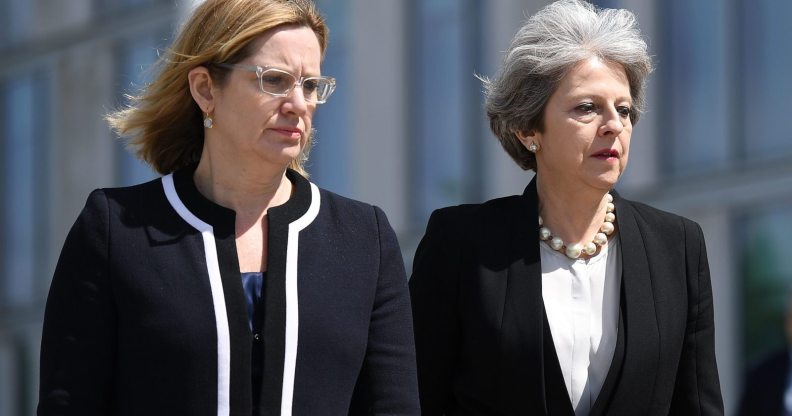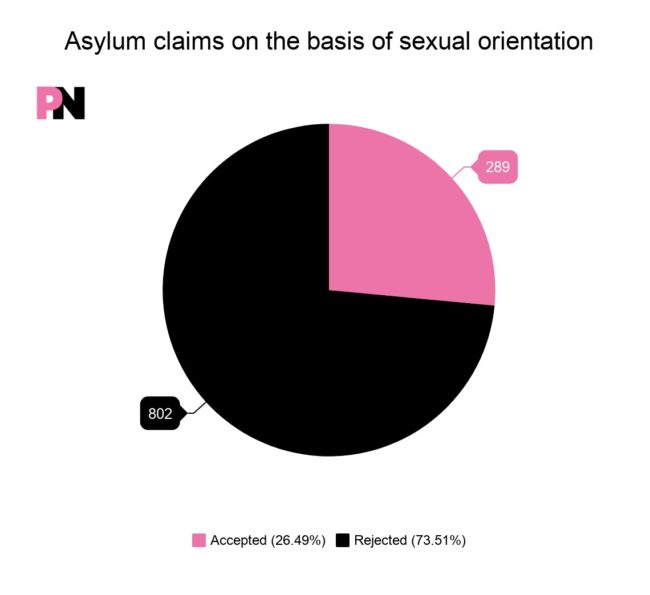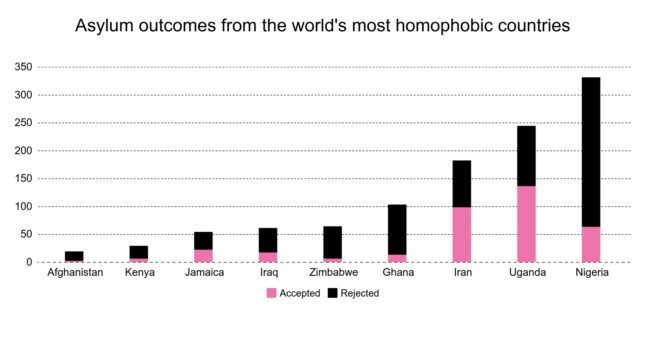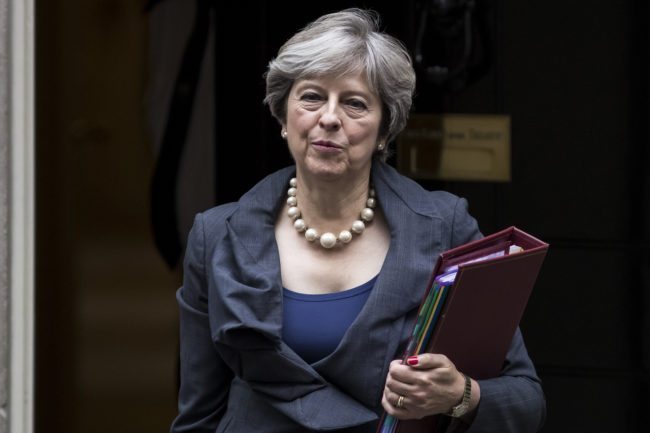It took the Home Office 13 months to answer these questions about gay asylum seekers

Amber Rudd and Prime Minister Theresa May (Leon Neal/Getty Images)
The Home Office took 13 months to provide details about gay asylum claims to PinkNews, after a Freedom of Information Act request.
Hundreds of people apply for asylum in the UK each year on the basis of sexual orientation, having fled from countries where they could face prison, violence, or death for being gay.
Campaigners have long criticised the UK’s approach to gay asylum seekers, criticising a system that often requires people to ‘prove’ their sexuality in arbitrary and convoluted ways, and frequently leaving people facing deportation back to countries where they face persecution.
In December 2016, PinkNews filed the Freedom of Information Act request, seeking to force the Home Office to publish data on gay, lesbian and bisexual asylum claims for the first time.
The request asking the government to confirm the number of people claiming asylum in the last 12 months who did so on the grounds of sexual orientation or gender identity, the number of such claims granted, and the number of such claims refused.
Although the request would usually compel the Home Office to respond within 20 days, the government pushed back the deadline repeatedly under a qualified exemption that relates to disclosures “inhibiting the free and frank provision of advice”.
The Home Office has now finally provided the data – in January 2018, more than a full year after the request was submitted.
The data confirms that 1,436 people attempted to claim asylum relating to sexual orientation between 1 October 2015 and 30 September 2016, but just 289 applications were granted.

Meanwhile, 802 cases were rejected, amounting to nearly three-quarters of cases with decisions.
The department added: “We apologise for the delay in dispatching your requested information.”
The Home Office provided the data to PinkNews only after the publication of a report in November which made much of the data relating to LGBT asylum claims public for the first time.
That report, which the Home Office describes as “experimental”, covered a period of time between July 2015 and 31 March 2017 – and showed that thousands of gay and lesbian asylum seekers have been turned away from the UK.
A total of 3,535 asylum applications were made by people fleeing persecution at least partly based on their sexual orientation, amounting to six percent of asylum claims.
However, more than two-thirds of these were rejected.
Of cases with a clear resolution, 2,379 claims were rejected, and just 838 approved.
The data also shows that asylum claims were rejected from gay people who fled persecution under some of the most violent homophobic regimes on the planet.
Eighty-four people from Iran, where homosexuality is punishable by death, were denied asylum – nearly half of all of those who applied.
The Home Office accepted just 63 gay asylum seekers from Nigeria, where gay people can face extreme violence or decades in jail and 268 gay Nigerians were turned away.

Applications were also rejected from 108 gay asylum seekers fleeing Uganda, where gay sex is punishable by seven years in prison.
Not a single applicant from India or Sri Lanka, where homosexuality is a crime, was accepted – despite 82 and 48 applications respectively.
The majority of asylum seekers from Iraq, Afghanistan, Zimbabwe, Kenya and Jamaica were also turned away.
The data raises serious questions for Prime Minister Theresa May, who was Home Secretary for much of the time period and oversaw the asylum system.

Mrs May carried out a ‘review’ of the regulations for LGBT asylum seekers while serving as Home Secretary, but the system has been repeatedly exposed as discriminatory and failing.
The Home Office procedures for processing LGBT asylum seekers has been repeatedly criticised by campaigners over inconsistent standards that “humiliate” applicants, and often leave people facing deportation to countries where they face persecution for their sexuality.
One lesbian asylum seeker was told she couldn’t be gay because she has children, while another asylum seeker was compelled to show caseworkers explicit pictures of himself having gay sex to ‘prove’ his sexuality.
Another bisexual man, who fled from persecution in his home country, had his application challenged by the Home Office because he said the T in LGBT stood for ‘Trans’ as opposed to ‘Transgender’.
Many LGBT asylum seekers have been scheduled for deportation and told to go home and ‘act straight’.
The Home Office said: “These data are experimental statistics and should be interpreted with caution. Experimental statistics are statistics that are in a testing phase and are not yet fully developed.
“These statistics have not been subject to the full level of quality assurance of National Statistics.”
It adds that “a claim may be based on multiple factors” and that “the outcome of the claim may not be down to the sexual orientation component”.
Lord Scriven, Liberal Democrat Lords Spokesperson for International LGBT Rights, told PinkNews: “This is a record of shame for the government.
“This data reveals how vulnerable LGBT asylum seekers are when trying to claim safety and freedom here in the UK. Now we know why the Government have dragged their feet on releasing this data.
“Many of those people denied by the British Government are returning to places where they face harassment, imprisonment and even death just because of who they are.
“The Liberal Democrats will challenge the Government over these figures.
“It is proof that the UK is failing to offer a safe place of sanctuary for those fleeing violence and danger only for loving a person of the same sex.”
Paul Dillane, executive director of Kaleidoscope Trust, told PinkNews: “Around the world, LGBT people face discrimination and violence on a daily basis on account of their sexuality or gender identity. As a result, many people are forced to flee in search of protection in other countries.
“Despite well-documented instances of discrimination, disbelief and detention experienced by LGBT asylum seekers, it has been impossible to answer the simple question: how many LGBT people seek asylum in the UK?”
He added: “After years of intensive lobbying, the UK Home Office have finally published statistics.
“This is a welcome step forward but they raise a series of concerns: the statistics do not provide any information as to why a person seeking asylum on account of their sexuality was refused, trans people are excluded entirely and we do not know how many people were detained upon seeking asylum. Given the terrible abuses experienced by LGBT people in immigration detention, this is an issue which requires urgent attention.
“54% of Ugandans and 39% of Pakistanis were granted asylum on appeal indicating many lesbian, gay and bisexual asylum seekers were only granted refugee protection after being initially refused and taking their case to court: an expensive, timely and stressful process.
“Asylum claims by LGBT people are often matters of life or death. We urge the UK Home Office to take proactive steps to improve standards, training and the quality of decision-making to ensure LGBT people fleeing persecution are genuinely respected and protected.”
A Stonewall spokesperson said: “Lesbian, gay, bi and trans people face violence and persecution in many countries around the world, and many flee in fear of their lives.
“It’s vital those seeking asylum in the UK are treated fairly and with respect.
“These new figures show that many applications for asylum from countries where LGBT face violence were rejected. This is deeply troubling; what we don’t know from the report is why they were rejected.”
Stonewall added: “We’re calling on the Government to do more to ensure that asylum claims from LGBT people are treated fairly and with respect.
“This means an end to rules that allow LGBT people to be sent back if it is perceived they can escape violence by keeping their sexuality or gender identity secret.
“It means better and more training for officers to deal with claims sensitively, and it also means an end to the detention of LGBT asylum seekers. It’s devastating that so many people experience shocking abuse and violence in a country where they hoped to escape it.”
But Immigration Minister Brandon Lewis insisted: “This Government is committed to an asylum system which is supportive and responsive to those claiming asylum on the basis of their sexual orientation.
“All asylum claims lodged in the UK, including those on the grounds of sexuality, are carefully considered in accordance with our international obligations. Decision-makers are given dedicated training and guidance on how to handle such claims.
“No one who is found to be at risk of persecution or serious harm in their country of origin because of their sexuality will be returned.”
A court ruling earlier this year suggested that under Mrs May’s leadership, the Home Office may have illegally deported gay asylums seekers.
Speaking at the PinkNews Awards last year, the Prime Minister said: “Britain has come far in fifty years, but we know there is still a long way to go.
“Homophobia, biphobia and transphobia have still not been defeated, and they must be.”
She added: “When we look around the world, we see countries where the human rights of LGBT people are denied and terrible suffering is the result.
“On the world stage, we are standing up for LGBT rights, and challenging at the highest level those governments which allow or inflict discrimination or abuse.
“The anti-LGBT laws which remain in some Commonwealth countries are a legacy of Britain’s colonial past, so the UK Government has a special responsibility to help change hearts and minds and we will ensure that these important issues are discussed at the Commonwealth Heads of Government meeting, which we will be hosting here in London next April and also during our two years as Commonwealth Chair in Office.”
She added: “So, let me be absolutely clear. We have come a long way – but there is much still to do.
“The Government has a plan to deliver, and I am committed to ensuring that we work that through.
“Because LGBT history is all our history, LGBT success is everyone’s success, and LGBT rights are human rights.”

